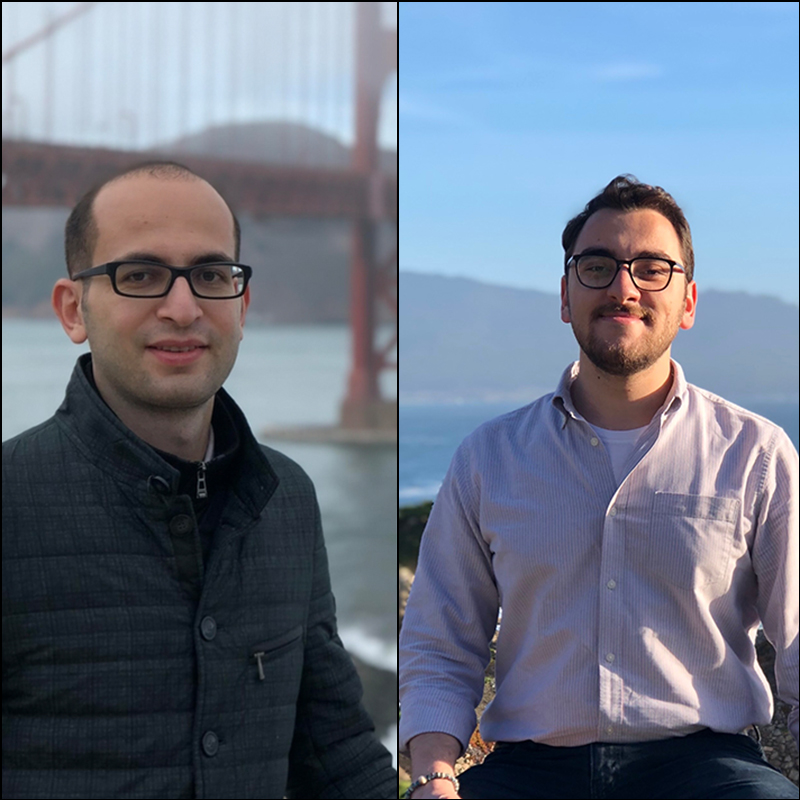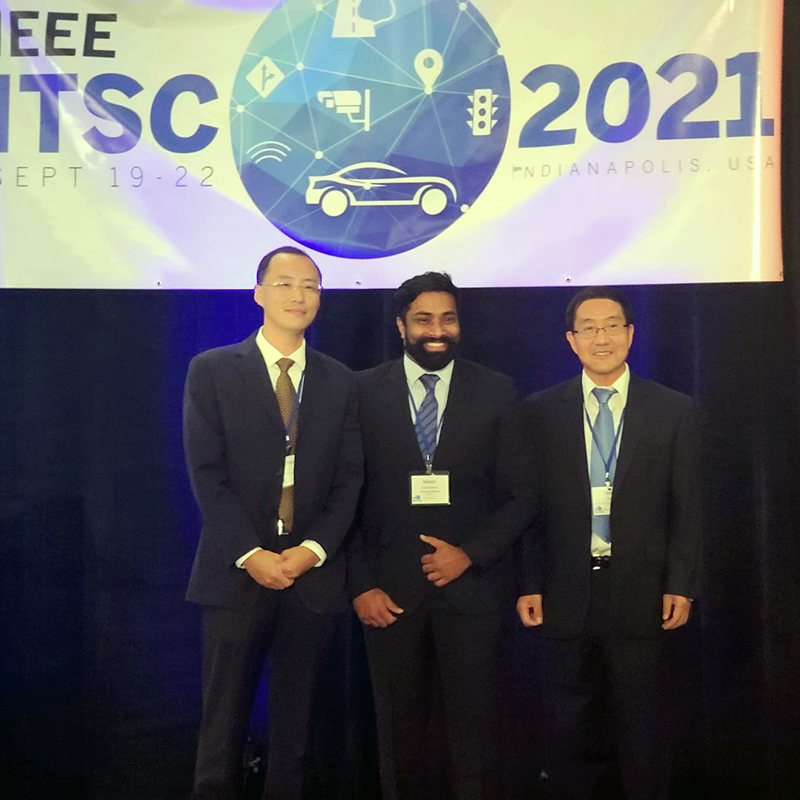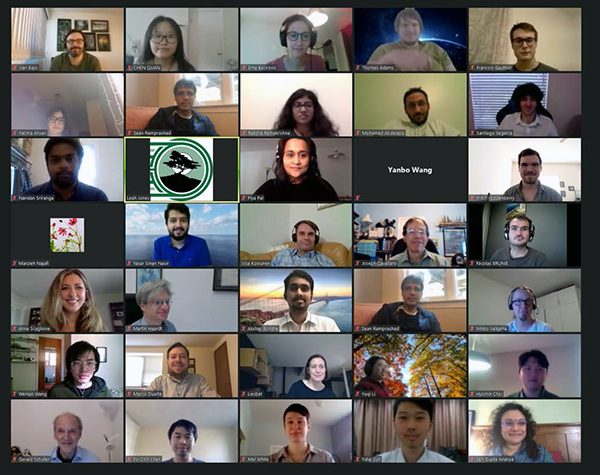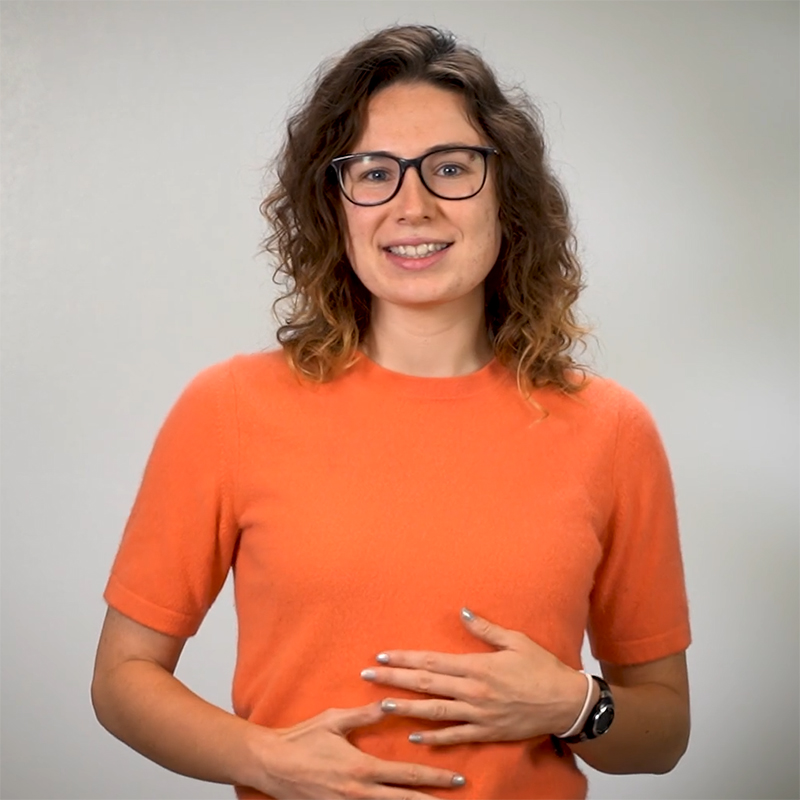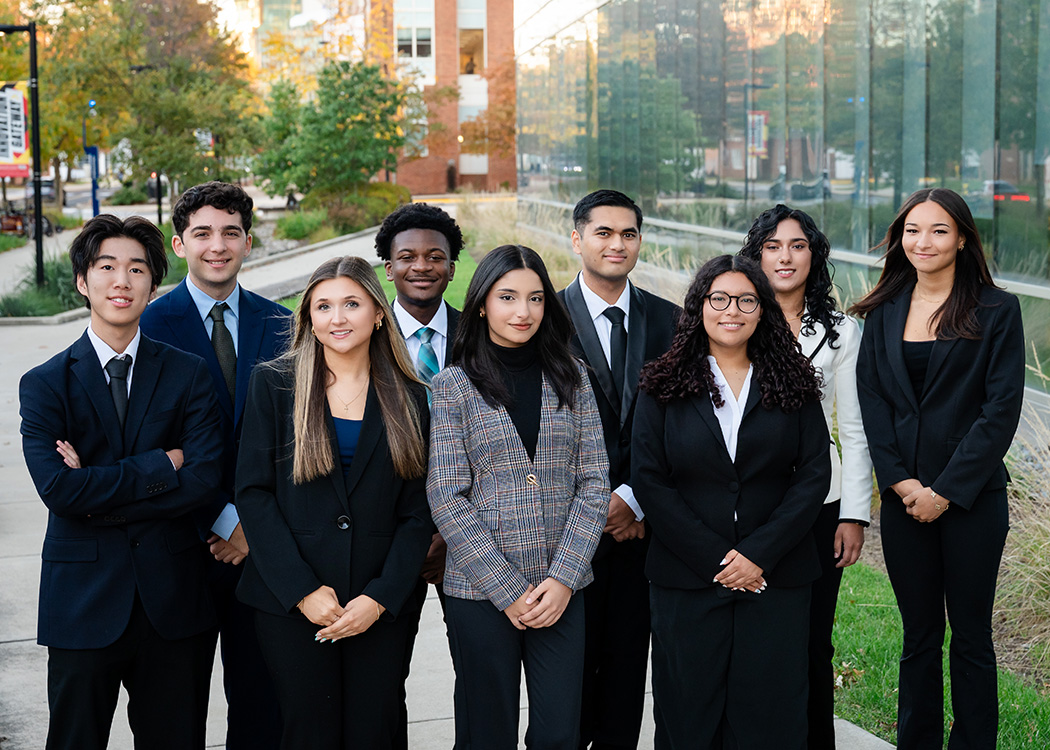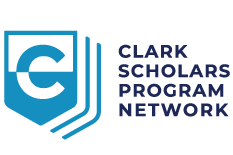News Story
ISR gives awards to Professor Richard La, four graduate students
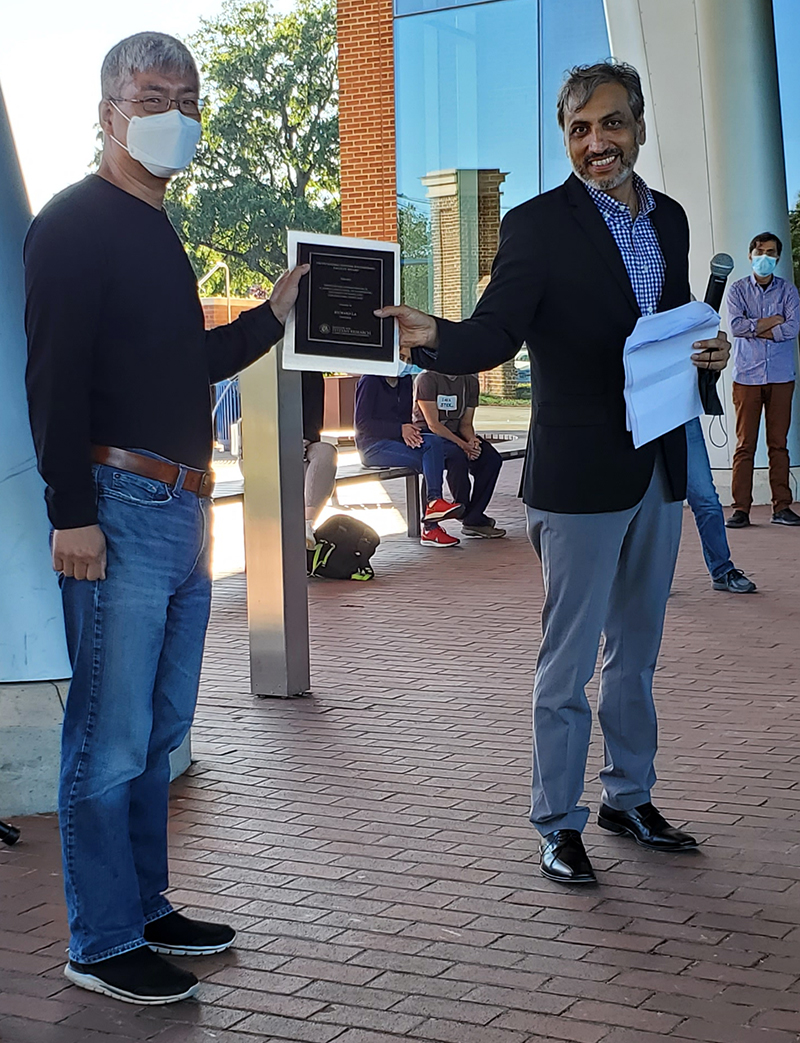
Richard La (left) receives the ISR Oustanding Faculty Award from ISR Director Ankur Srivastava.
On Sept. 29, ISR held its annual awards ceremony and reception on the plaza beneath the cantilever of the Iribe Building. This year ISR Director Ankur Srivastava bestowed five awards: one outstanding faculty award, and four George Harhalakis Outstanding Systems Engineering Graduate Student Awards.
ISR Outstanding Faculty Award: Richard La
Professor Richard La (ECE/ISR) was nominated for this award by André Tits, P. S. Krishnaprasad, Prakash Narayan and Nuno Martins, with support from Sennur Ulukus, Armand Makowski, and Michael Honig of Northwestern University.
Since joining the University of Maryland in 2001, Richard has successfully pioneered new theory, methods, and algorithms to address challenging problems in high-risk emerging areas centered on ISR-priority applications, including communication networks and complex systems. His research is inherently interdisciplinary, drawing from the core ISR areas of communications, control, and optimization theory. It often involves game theory and sophisticated statistics concepts and methods, all of which a single researcher rarely masters. Richard has collaborated on sponsored research; on graduate, undergraduate, and postdoc advising; and on publications with many current and former ISR joint appointees in a variety of domains, including Sarah Bergbreiter, Eyad Abed, Armand Makowski, Steve Marcus and Nuno Martins.
Richard's articles are invariably novel, rigorous, substantial, and reflect work that often takes years to meet his high standards for submission. His publication record includes at least 32 articles in top journals; 74 papers in selective conferences, including 12 invited; and two book chapters. These numbers are quite impressive considering not only the depth and novelty of the work, but also the quality of the writing.
Richard’s nominators estimate his current Google scholar citation count is near or exceeding 4000. Notably, two of his articles reporting his early work on the probabilistic properties of TCP have garnered a combined citation count of nearly one thousand.
Here is just one example of Richard’s superb work. Most recently, he has focused on robustness of complex systems to failures, funded by three single-PI NIST grants totaling $1.06M. The growing interdependence among the components of systems that results from physical coupling and communication networks is a major reason why tractable design methods are elusive. In his work, Richard seeks to develop design methods to ensure the robustness and minimize the vulnerability of large-scale engineered systems to widespread failures—an example being wide-scale blackout in power grids. Richard’s theoretical results are some of the first to characterize the relationship between the robustness of complex systems and structural properties of dependence graphs. The work is technically superb and relies on mastering advanced economics/game theory, physics, probability theory, and social science concepts. His nominators note that Richard’s work is impressive, timely, and focuses on ISR core themes.
George Harhalakis Outstanding Systems Engineering Graduate Student Award: Ashley Chapin
Ashley Chapin is a fifth-year Bioengineering Ph.D. student of Professor Reza Ghodssi, who nominated her for this award. Ashley’s specific field is neuroscience systems integration.
Dr. Ghodssi writes that Ashley excels both at performing novel multidisciplinary work and demonstrating leadership and mentorship at the university, and that her work strongly reflects the values of the ISR.
Ashley is developing a biosensor-integrated cell-culture compatible system that can monitor serotonin signaling in the gut. The end goal is to one day produce a biomedical device that will aid scientists in understanding how different gastrointestinal factors may affect brain functioning.
Ashley has used her creativity, bioengineering background, and learned systems design and fabrication techniques to translate this concept into multiple types of in vitro and in vivo systems for research, clinical diagnostics, and personalized medicine. She has worked both on measuring serotonin secretion from cultured gut cells as a proxy for gut tissue and on the design of a microneedle electrode that can be integrated into an ingestible capsule technology to measure serotonin within the GI tissue. This microneedle is the subject of the group’s newly filed patent application.
In the past year, she has had three papers published, one in IEEE JMEMS and two in the Nature journal Microsystems and Nanoengineering. She is first author on two of the papers.
Ashley’s research has attracted the interest of many collaborators from institutions like the University of Maryland Baltimore and Johns Hopkins University. She has contributed to Dr. Ghodssi’s group winning two significant grants to continue the research, including an NSF grant.
She has received a number of prestigious student awards. She won a 2019-20 Fischell Fellowship for outstanding biomedical research, the Mid-Career Clark Doctoral Fellowship and an Ann G. Wylie Dissertation Fellowship, demonstrating excellence in her research and education. Last year she won the UMD Three-Minute Thesis contest.
Ashley has leveraged her unique skillset in cell and molecular biology alongside methods such as metal deposition, electrochemistry, and package design to produce systems that can support healthy cell cultures while extracting molecular information. These will inspire new generations of neuroscience-based systems through the integration of compatible modules such as sensors, actuators, or biological agents.
George Harhalakis Outstanding Systems Engineering Graduate Student Award: Baturalp Buyukates
Baturalp Buyukates is a student of Professor Sennur Ulukus, who nominated him for this award. Baturalp joined the ECE PhD program in 2016 with a Clark School Distinguished Fellowship.
Baturalp has had an outstanding academic and research performance during his PhD studies here. He has published 5 journal papers, 12 conference papers and 1 book chapter, with additional conference papers and journal papers currently in preparation. This is a remarkable achievement in his theoretically and mathematically oriented field. Baturalp also has been a fellow of the Clark School’s Future Faculty Program.
His research is on age of information in distributed computation and learning systems. Baturalp has made fundamental contributions on several distinct problems within this exciting new field. In almost all problems he has studied, Baturalp is the first to formulate the problem, and therefore has written the leading papers in each of these topics. For example, Baturalp is the first to study scaling of age in large networks where many transmitters update many receivers simultaneously. He is also the first to formulate a computation intensive update system where raw data are captured and sent to a cloud server system to be processed to construct short update packets from them.
Baturalp’s conference papers have been recognized at two consecutive years of the Asilomar Conference on Signals, Systems and Computers. In 2019, his paper was chosen as a finalist for the best student paper award, the only paper chosen in the entire Communications Track. In 2020, his paper won 2nd place among all finalists in all tracks.
Baturalp’s research is highly interdisciplinary, combining techniques from different fields. He brings innovative and creative approaches to practical problems and has made significant contributions to communication and information systems, distributed learning systems, computationally intensive update systems, and massively deployed IoT systems.
George Harhalakis Outstanding Systems Engineering Graduate Student Award: Christos Mavridis
Christos Mavridis is an ECE PhD student of Professor John Baras, who nominated him for this award.
Dr. Baras cites Christos’ outstanding research work and results on the foundations of machine learning and deep learning that are superior to state of the art. He also notes Christos’ discovery of coordination laws in large ensembles—an equally important and challenging problem for multi-agent systems and their decision making and collaboration.
In addition to the seminal value of his theoretical work and results, the many practical applications of his work include control of collaborative robots, control of robot and human teams, control of cyber-physical systems, analyzing social network dynamics and structure, understanding the importance of “leaders” in social networks, developing high performance classification algorithms for vision and sound classification and understanding.
Dr. Baras writes that these constitute some of the most challenging ML and DL problems today: “Christos has already obtained new fundamental results that will have long lasting impact on the field of ML and its applications in systems, control and communications. His approach and results are completely ‘out of the box’ and provide answers to some long-sought understanding by leaders in these fields.”
Christos has received many awards, including the Ann G. Wylie Dissertation Fellowship, a Future Faculty Program Fellowship, the UMD Distinguished Graduate Fellowship, an Outstanding Research Assistant Award, and a scholarship from the Gerontelis Foundation MA. He was a finalist for the highly competitive and selective Qualcomm Innovation Fellowship. He has a patent pending entitled “IoT Feature Selection for Efficient Storage and Computation.”
Dr. Baras writes that Christos is a brilliant, creative and very hard-working student, whose ambition is to become a faculty member in a top research University. He combines unusual knowledge of mathematics and algorithms, computer implementation skills, and modeling capabilities. Christos is able to dive deeply into a problem, he is fearless in his research efforts and a very independent thinker.
George Harhalakis Outstanding Systems Engineering Graduate Student Award: Melih Bastopcu
Melih Bastopcu is an ECE PhD student of Professor Sennur Ulukus, who nominated him for this award. Melih joined the ECE PhD program in 2016 as a Clark School Distinguished Fellow.
Melih has published 4 journal papers, 13 conference papers and 1 book chapter, with several conference and journal papers currently under preparation. This is a remarkable achievement in his theoretically and mathematically oriented field. Melih has been a fellow of the Future Faculty Program, and has received the ECE Outstanding Teaching Assistant Award and the George Corcoran Memorial Award in Recognition of Excellence in Teaching.
Melih’s research concentrates on timely communication, caching, and tracking of information over networks. His original and creative research has made fundamental contributions to this emerging field. He has identified, motivated, formulated and solved several foundational problems ranging from human-social networks, to caching systems, to data compression, to tracking infectious diseases in a population.
For example, Melih created the concept of “soft updates” that occurs when humans update each other in person or through social media apps. He formulated the joint consideration of freshness and quality of updates. He introduced the concept of partial updates which trades accuracy for freshness. He incorporated selective encoding into timely source coding problem. He introduced timeliness in tracking counting processes. He formulated how cached information should be updated in networks for freshness. He developed a timely group updating method akin to group testing to minimize age and maximize timeliness in group testing for infectious diseases. He also introduced the concept of timely tracking of binary random processes, an application of which is to design test schedules for individuals in a population to track their infection status in a most timely manner. These last two achievements are especially important in the time of COVID.
Melih’s innovative, high-impact and creative research is of the highest caliber. He works on practically important engineering problems using mathematical rigor, and aims to obtain practically implementable solutions and practical design insights. Melih is prolific and interdisciplinary: his research spans the fields of communication theory, queueing theory, information theory, and optimization.
University of Maryland staff service awards
The following staff were honored with service awards from the University of Maryland for their service through 2019.
Carla Scarbor - 20 years of service
Dawn Wheeler - 15 years of service
Vicci Barrett - 5 years of service
Thank you to these dedicated staff for their service to ISR and the university.
Published September 29, 2021
